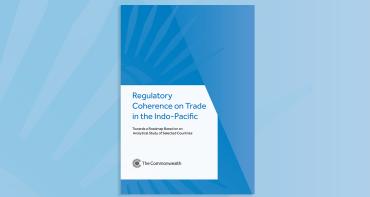Government officials from 10 Commonwealth countries in western and southern Africa have agreed to implement a set of policy initiatives that will promote youth entrepreneurship as an antidote to rising levels of youth unemployment.

Government officials from 10 Commonwealth countries in western and southern Africa have agreed to implement a set of policy initiatives that will promote youth entrepreneurship as an antidote to rising levels of youth unemployment.
The commitment was made by over 50 senior representatives from ministries of labour, youth development, trade and industry who participated in a policy workshop on youth entrepreneurship in Johannesburg, South Africa, from 23 to 25 November.
Countries represented included Sierra Leone, Ghana, Nigeria, Cameroon, Malawi, Mozambique, Botswana, Lesotho, South Africa and Swaziland.
The workshop was convened by the Commonwealth Secretariat’s Youth Division in partnership with Ford Foundation and the United Nations Conference on Trade and Development (UNCTAD), and hosted by the Government of South Africa. It was attended by young entrepreneurs who are members of the Commonwealth Alliance of Young Entrepreneurs (CAYE) for southern and western Africa, as well as experts from NGOs, universities and enterprise development incubators.
As highlighted by the Commonwealth’s recently published Global Youth Development Index and Report, high levels of youth unemployment are significantly hampering the developmental prospects of the 265 million young people between the ages of 15 and 29 in a region that is home to nearly 15 per cent of the global youth population.
According to UN population forecasts, sub-Saharan Africa is the only region in the world that will be more youthful in 2050 than it is today - a projection that underscores the importance of providing the support that young people need to succeed as budding entrepreneurs and future employers.
“This workshop has been a real eye opener. We have learnt so much about the critical importance of youth entrepreneurship to our national development goals,” said Mr Lukman Abdul-Rahim, Executive Director of the National Board for Small Scale Industries, Government of Ghana. “The workshop has given us the tools and ideas we need to ensure young people’s needs and aspirations are put at the centre of our entrepreneurship development framework when we go back home.”
The workshop in Johannesburg was the second in a series of regional technical workshops planned by the Commonwealth Secretariat, based on a Policy Guide on Youth Entrepreneurship developed in partnership with UNCTAD. The inaugural regional workshop was convened in Tanzania in May for government officials from eight member states in eastern Africa. The guide focuses on the policy domains that are critical to creating an optimal environment for youth entrepreneurship, such as youth-friendly regulation, entrepreneurship education and skills development, access to finance and harnessing the potential of technology and innovation.
Ms Laila Ncwana, Deputy Director for Implementation of Strategic Frameworks in South Africa’s Ministry for Economic Development, said: “The policy guide is a very timely resource that has shown how we can create a better environment to get our young people more excited about becoming entrepreneurs. This workshop has also been hugely helpful in boosting our capacity to implement and monitor our policies and plans in a structured and cohesive way across all key government ministries.”
The senior officials, young entrepreneurs and technical experts at the workshop identified the key challenges that young entrepreneurs currently face in African countries, shared examples of good practice and successful policy interventions in the region, and also produced country-specific action plans that will enable member governments and young entrepreneurs capitalise on the opportunities being created by regional and global trade flows.
“There is not much of an entrepreneurial culture in this region at the moment. We need to change that. It is really great that the Commonwealth invited young people as part of the government delegations from each country,” said Ms Wangiwe Joanna Kambuzi, a CAYE member from Malawi. “I am very confident that if our governments can implement some of the knowledge gained from this workshop, the next generation of Africans will tell their parents that they want to be entrepreneurs when they grow up.”
Lorenzo Tosini, a Project Officer at UNCTAD, expressed high hopes for the outcomes of the initiative. “Based on our experience, we are confident that this workshop will spur governments to integrate youth entrepreneurship in their national development plans with a view to achieve, in particular, the two Sustainable Development Goals on quality education and decent work and economic growth,” he stated.
“Entrepreneurship is a key plank in the Sustainable Development Goals, and a vehicle for African youth. It is key to resolving not only issues of unemployment, but also poverty and ultimately conflict,” added Dr Uchenna Paschal Anosike, Director of the Centre for African Entrepreneurship and Leadership, who was a delegate at the workshop. “We cannot pretend that we can achieve all these aspirations as a continent without having a national strategy around entrepreneurship. It cuts across every international agenda.”
Olalekan Oshunkoya, a young entrepreneur from Nigeria also in Johannesburg, echoed this call. “A national [entrepreneurship] strategy is essential, and being part of this process from the beginning is very exciting. It allows young entrepreneurs to know that we have a voice, to sit down at the table with policy-makers to address the issues we face and to share our experiences, so we can collectively find solutions.”
“With a growing youth population, expanding the range of economic opportunities available to young people – particularly in terms of self-employment and entrepreneurship - is a critical policy imperative for Commonwealth countries in Africa.
The policy guide, the Youth Development Index and this capacity-building technical workshop underline the importance we at the Commonwealth Secretariat place on ensuring that our member governments develop the evidence-based policies and systems that will enable the young people in Commonwealth countries fulfil their goals and almost limitless potential,” said Abhik Sen, Head of Policy and Research, Commonwealth Secretariat Youth Division.



